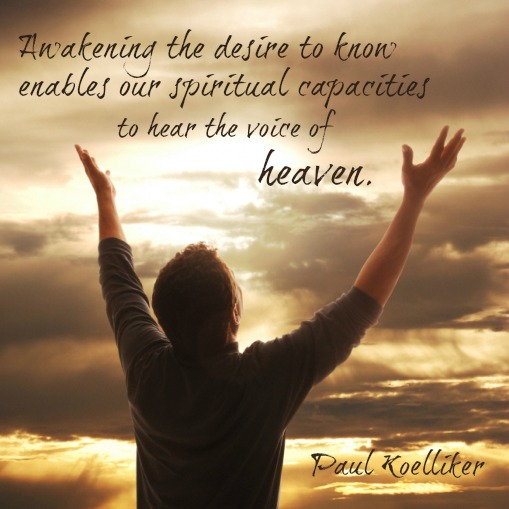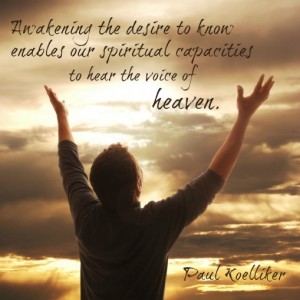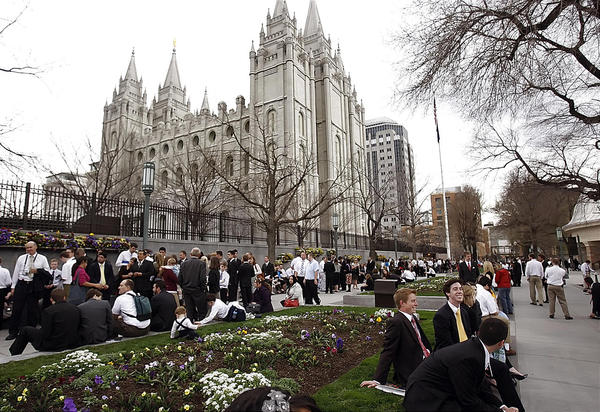
by Terrie Lynn Bittner | Oct 29, 2012 | Mormons in the News
Mormon officials expected missionary applications to increase when they lowered the age for the voluntary service, but they might have been surprised at just how interested teenagers are in serving missions as soon as possible. While an average week brings in 700 new applications, the two weeks following the announcement produced about 4,000 applications per week. A little more than half of those were from women. In the past, only about one-fifth of missionaries were women, but it is clear the percentage is about to become much larger, despite the fact that missionary work is permitted but not expected of women.
Previously men could serve at age nineteen and women at twenty-one. The new guidelines allow men to serve at age eighteen once they’ve graduated from high school or the equivalent and women to serve at age nineteen. In a press conference, it was explained that experience has taught them it is wise to have at least some age separation between the men and the women. During missions, young adults agree not to date, watch television, or participate in other secular activities. They are to use that time as a unique opportunity to become grounded in their faith and to focus on the needs of others instead of their own interests and needs. They do extensive service as well as teaching the gospel.
 For most young people, missionary service is a life-changing experience. Many strengthen their testimonies during this time, realizing that in order to effectively share their faith with others, they need to be certain of their own testimony. They have an unusual amount of time to focus in on scriptures and religion and to develop habits of daily prayer, scripture study, and service to others. By explaining their faith to others and answering any questions they are asked, they gain a clearer understanding of the doctrine because they think it through more completely in order to know how to explain it to others. Their teaching and leadership skills increase over the course of their mission. They become more aware of the blessings that accompany living the way Jesus Christ asks us to live. (more…)
For most young people, missionary service is a life-changing experience. Many strengthen their testimonies during this time, realizing that in order to effectively share their faith with others, they need to be certain of their own testimony. They have an unusual amount of time to focus in on scriptures and religion and to develop habits of daily prayer, scripture study, and service to others. By explaining their faith to others and answering any questions they are asked, they gain a clearer understanding of the doctrine because they think it through more completely in order to know how to explain it to others. Their teaching and leadership skills increase over the course of their mission. They become more aware of the blessings that accompany living the way Jesus Christ asks us to live. (more…)

by Terrie Lynn Bittner | Oct 23, 2012 | About Mormons
Twice a year, Mormons hold a General Conference, giving them an opportunity to hear from their leaders. The conference is broadcast worldwide and over the Internet. The transcripts and video recordings are made available on the Mormon website after the conference, as well. Mormon is a nickname sometimes used to describe members of The Church of Jesus Christ of Latter-day Saints.
 The Conference is held in Salt Lake City, Utah each April and October. Salt Lake City became the Church headquarters after the Mormons settled there following intense persecution that included murders in the 1800s. Since that time, the Church has become world-wide.
The Conference is held in Salt Lake City, Utah each April and October. Salt Lake City became the Church headquarters after the Mormons settled there following intense persecution that included murders in the 1800s. Since that time, the Church has become world-wide.
Members who have tickets come to the conference dressed as they would dress for church—suits for the men and dresses for the women. The conference is held on Saturday and Sunday both, with some special sessions, such as one for women, held at other times close to the conference date. Ticket holders generally attend just one session in order to give as many people as possible an opportunity to attend. (more…)
by Terrie Lynn Bittner | Oct 22, 2012 | Mormon Beliefs: Christian Values
Ashoka U has named Brigham Young University as a Changemaker school. Brigham Young University, often referred to as BYU, is owned and operated by The Church of Jesus Christ of Latter-day Saints, whose members are sometimes nicknamed Mormons.
Changemaker campuses must meet a strict set of criteria. Campuses must make social entrepreneurship a priority and be able to show they understand how this will impact and benefit their students and programs. The programs must require students to work in effective teams, putting the team and the program before the needs of the individual team members. Students must be trained to have empathy for others, to be ethical in bringing about change, and to be trustworthy. They must be taught that changing the world will be their mission in life and students must be given the skills and attitudes that will make that a realistic goal.
The process for becoming a Changemaker campus is intense. Campuses must complete an in-depth application which involves evaluating your campus and making changes as necessary, using criteria developed by the organization. The campus then interviews with the organization and again makes changes based on the recommendations. Ashoka next visits the campus and provides coaching to help the school prepare for the final evaluation and decision. In the past four years, only nineteen schools have qualified for the designation. Once chosen, the schools receive mentoring and partnership opportunities. (more…)
by Terrie Lynn Bittner | Oct 22, 2012 | Mormon Beliefs: Christian Values
This weekend I attended the funeral of a friend. As I watched the proceedings, I couldn’t help but note that while there are many similarities between Mormon funerals and others, there are also differences. Those differences are significant because they illustrate the way Mormons view their beliefs.
The first thing a person who isn’t Mormon might notice when he arrived at a Mormon funeral is that most of the people aren’t dressed in black. Mormons see the funeral as a time of sadness for those who loved the person who died, but more in the way we’re sad when a friend or family member moves far away and we won’t be seeing them for a long time, not as a permanent end to life or love. We don’t wear black the day the day a friend or family member moves away.
Mormons believe that through Jesus Christ’s atonement, everyone will be resurrected and live forever. Most people will go on to live in Heaven. Only those who are truly evil or have denied the Savior after being shown for certain He lives would be denied Heaven, although not everyone will live with God. The Bible sets out specific requirements for that special privilege, but Mormons do not believe you have to have been Mormon in this life to go to Heaven or even to live with God, although you will have to accept the gospel once you’ve received a testimony of it. All levels of Heaven are wonderful places to spend eternity. (more…)
by Terrie Lynn Bittner | Oct 16, 2012 | Mormons in the News
Philanthropy Roundtable featured a detailed article about a private welfare program that is succeeding at changing lives and helping people achieve self-sufficiency. This program is run by The Church of Jesus Christ of Latter-day Saints, whose members are often called Mormons. It helps Mormons to get through temporary difficult times and to give them the skills and resources to become independent. Additional programs serve people who are not Mormon world-wide.
For Mormons, the program is detailed. Although it is called a welfare program, it bears little resemblance to government welfare. Recipients do not receive a check to spend as they choose. They first meet with their ecclesiastical leader, a lay pastor who is called a bishop, to assess the family’s needs. These needs may be fairly comprehensive and so each program is completely personalized to meet those individual needs.
To cover the costs of this particular program, Mormons who are healthy are asked to fast for twenty-four hours the first Sunday of each month. They go without food or drink of any kind, including water, skipping two meals and all snacks. They then donate at least what they would have spent on food and drink to a special fund called the fast offering. This money funds the food and other commodities a person in their own congregation needs. If a congregation has few needs, their excess is used to help those congregations with greater needs and fewer who can provide it. (more…)

 For most young people, missionary service is a life-changing experience. Many strengthen their testimonies during this time, realizing that in order to effectively share their faith with others, they need to be certain of their own testimony. They have an unusual amount of time to focus in on scriptures and religion and to develop habits of daily prayer, scripture study, and service to others. By explaining their faith to others and answering any questions they are asked, they gain a clearer understanding of the doctrine because they think it through more completely in order to know how to explain it to others. Their teaching and leadership skills increase over the course of their mission. They become more aware of the blessings that accompany living the way Jesus Christ asks us to live. (more…)
For most young people, missionary service is a life-changing experience. Many strengthen their testimonies during this time, realizing that in order to effectively share their faith with others, they need to be certain of their own testimony. They have an unusual amount of time to focus in on scriptures and religion and to develop habits of daily prayer, scripture study, and service to others. By explaining their faith to others and answering any questions they are asked, they gain a clearer understanding of the doctrine because they think it through more completely in order to know how to explain it to others. Their teaching and leadership skills increase over the course of their mission. They become more aware of the blessings that accompany living the way Jesus Christ asks us to live. (more…)

 The Conference is held in Salt Lake City, Utah each April and October. Salt Lake City became the Church headquarters after the Mormons settled there following intense persecution that included murders in the 1800s. Since that time, the Church has become world-wide.
The Conference is held in Salt Lake City, Utah each April and October. Salt Lake City became the Church headquarters after the Mormons settled there following intense persecution that included murders in the 1800s. Since that time, the Church has become world-wide.